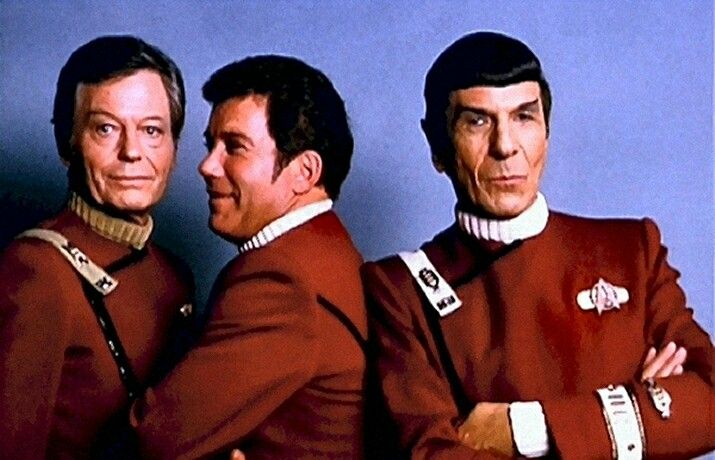The Hollywood blockbuster has become a staple of the American movie-going experience. At Christmas or during the summer, studios unleash action-packed franchise films to audiences craving escape. Of all the Hollywood franchises and blockbusters of the post-Jaws age the original six Star Trek features are among the most iconic and the most unconventional. Helmed by Harve Bennett, Nicholas Meyer, Jack B. Sowards, Leonard Nimoy, Gene Roddenberry and William Shatner, the Star Trek franchise was able to revive itself after a long hiatus and launch numerous spinoffs.
But it is the conventions of a Star Trek film that make them a different kind of blockbuster. Films like Terminator 2, Jurassic Park, The Avengers, the Harry Potter and Rambo films, and Aliens all have a distinct affiliation towards big special effects, an abundance of action, and a lot of cheap thrills. While on the other hand your average adventure with Captain James T. Kirk (William Shatner) has a lot of special effects, a little action, and some suspense. The reason Star Trek is still successful as a blockbuster despite these differences is the characters. During the three years Star Trek ran on television from 1966 to 1969 it established its characters and their world with audiences nation wide. In fact, it was the audience demand for more Star Trek that brought about the six subsequent films. That said, each Star Trek film has had the luxury of telling the story of the characters James T. Kirk, Spock (Leonard Nimoy) and Dr. “Bones” McCoy (DeForest Kelley) rather than manufacturing a fast paced narrative in which character comes as a second priority.

Every Star Trek film has at its base either a moral or philosophical revelation. In Star Trek: The Motion Picture Kirk comes to realize his higher rank and older age have distanced him from the man he once was at the helm of the original series. In the second film, The Wrath Of Khan, Kirk must not only atone for Khan’s fate after the outcome of the original series episode Space Seed, but for that of his broken marriage and his subsequently abandoned son. Each film works like this, foregrounding the personal conflicts of Kirk against what would be an investigation of a philosophical quandary. But even putting it like that does little justice to the weighty messages the narratives of these films bolster. The Undiscovered Country deals, in a strictly allegorical sense, with the Cold War, and with racial tensions. This kind of plotting makes the Star Trek films not only extremely relevant to their time of release, but again during the second or third viewing. I am joining the chorus when I say that the endurance of Star Trek is primarily due to the timelessness of its stories, on TV or in the cinemas.
Another decidedly different factor between Star Trek and most conventional blockbusters is the age of its cast. By the time they had completed their final film in 1992, all the cast was into their fifties or sixties. Yet, despite the age of the films stars, only the first film sports younger cast members in an attempt to engage a new target audience. And these two characters don’t even appear in the next five films. What audiences wanted and expected was the now middle-aged crew of the original series. The Star Trek films don’t shy away from addressing the crew’s mortality either. Every film contains a reference or an allegory concerning mortality. It’s a question posed to Kirk in almost every film whether he is too old to be commanding the Enterprise.
By their very nature one would not suspect Star Trek of being blockbuster gold yet the films number six and span over a decade, proving without a doubt their financial certainty. Looking now at the blockbusters that have been released in the last decade, one doesn’t see any blockbusters of this nature. Even Peter Jackson’s Lord Of The Rings trilogy lacks the clear and believable characters that Star Trek boasts. George Lucas’ second-wave and Disney’s third-wave of Star Wars films are anything but cinematic and relevant. So audiences are left with a void where Star Trek used to be. Star Trek can’t come back, not in this incarnation anyway having been replaced by the J.J. Abrams reboot. So a new franchise has to fill the shoes of Star Trek, providing provocative and character driven blockbusters to audiences every summer.
